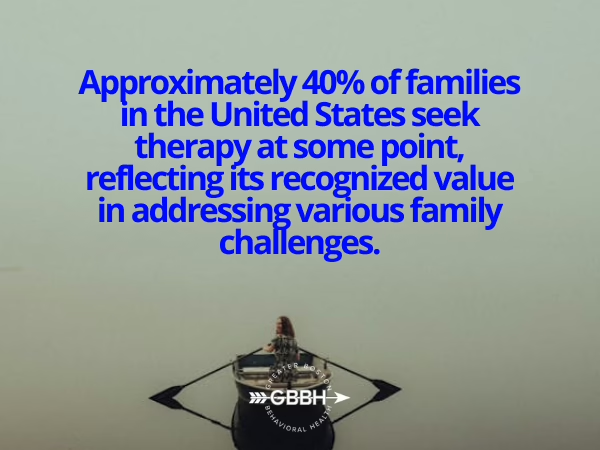Family is often considered the foundation of emotional and psychological support. However, when one or more family members face mental health challenges, substance use disorders, or behavioral issues, the entire family dynamic can be affected. Conflicts, communication breakdowns, and emotional strain can make it difficult for families to navigate challenges in a healthy way.
Family therapy offers a structured, evidence-based approach to healing relationships, improving communication, and fostering understanding among family members. When incorporated into mental health treatment programs, family therapy can enhance recovery, reduce relapse risks, and create a strong support system that benefits everyone involved.
At Greater Boston Behavioral Health, we understand that mental health treatment should extend beyond the individual. Our Family Therapy Programs are integrated into Intensive Outpatient Programs (IOP), Partial Hospitalization Programs (PHP), Residential Treatment Programs, and Inpatient Treatment Programs to ensure that both the individual and their family receive the support they need.
This guide will explore the role of family therapy, its key benefits, and how it promotes healing for individuals and their loved ones.
What is Family Therapy?
Family therapy is a specialized form of psychotherapy that focuses on family dynamics, communication patterns, and emotional connections. Unlike individual therapy, which centers on one person’s mental health, family therapy involves multiple family members to explore their interactions and collective healing.
A licensed family therapist guides sessions, helping families:
- Improve communication skills
- Resolve conflicts in a healthy way
- Understand and support mental health recovery
- Develop problem-solving strategies
- Strengthen emotional bonds
Family therapy is often incorporated into Boston behavioral health programs to ensure that the entire support system is involved in the healing process.
Who Can Benefit from Family Therapy?
Family therapy is beneficial for families facing:
- Mental health challenges such as depression, anxiety, PTSD, or bipolar disorder.
- Substance use disorders or co-occurring mental health conditions.
- Behavioral issues in children, adolescents, or adults.
- Communication problems leading to frequent misunderstandings or conflicts.
- Major life transitions such as divorce, relocation, or loss of a loved one.
- Parent-child relationship challenges that need intervention.
- Marital or relationship stress impacting the entire family.
Family therapy helps individuals understand one another’s experiences, develop empathy, and create a supportive home environment for recovery.
The Benefits of Family Therapy
1. Improves Communication and Conflict Resolution
Miscommunication is a major cause of family conflict. Family therapy teaches family members to express their emotions, needs, and concerns effectively while also improving their listening skills.
How Family Therapy Enhances Communication:
- Encourages open and honest discussions.
- Helps family members learn active listening techniques.
- Teaches assertive communication instead of passive-aggressive or avoidant behaviors.
- Guides families on how to address conflicts in a productive way.
Example: If a parent struggles with depression, their child may misinterpret their withdrawal as disinterest. Therapy bridges the communication gap and provides a space for understanding.
2. Strengthens Emotional Bonds
When families experience conflict, trauma, or ongoing stress, emotional connections weaken. Family therapy provides structured sessions that encourage members to reconnect emotionally.
Key Ways Therapy Strengthens Family Bonds:
- Promotes emotional validation among family members.
- Facilitates healing from past conflicts and misunderstandings.
- Helps family members express appreciation and support for each other.
Strengthening family connections fosters emotional security and trust, which are essential for long-term relationship stability.
3. Supports Mental Health Recovery and Relapse Prevention
Mental health disorders like depression, anxiety, bipolar disorder, and PTSD can be isolating for both the individual and their family. Family therapy educates family members about mental health conditions, symptoms, and effective ways to provide support.
How Family Therapy Supports Mental Health Recovery:
- Reduces stigma and misunderstandings about mental health.
- Teaches family members how to respond to emotional crises.
- Encourages families to develop coping strategies for stress and conflict.
At Greater Boston Behavioral Health, we integrate CBT Therapy and DBT Therapy into our Mental Health Treatment Programs to equip families with skills to support their loved one’s recovery.
4. Helps Families Navigate Addiction and Substance Use Recovery
For individuals recovering from substance use disorders, family therapy is a vital component of relapse prevention. Family involvement can provide accountability, encouragement, and support throughout the recovery journey.
Key Benefits of Family Therapy in Addiction Recovery:
- Addresses co-dependent or enabling behaviors.
- Provides education on triggers and risk factors for relapse.
- Helps establish healthy boundaries and expectations for sobriety.
Example: If a family unknowingly enables a loved one’s addiction by ignoring signs of relapse, therapy can help them develop a proactive plan for intervention and support.
5. Provides Parenting Support and Guidance
Parenting can be challenging, especially when children or adolescents experience behavioral or emotional struggles. Family therapy provides parenting strategies to create a structured, supportive, and emotionally healthy home.
Therapy Helps Parents By:
- Teaching positive discipline techniques.
- Providing guidance on setting clear expectations and boundaries.
- Helping parents understand how their communication style affects their child’s behavior.
At Greater Boston Behavioral Health, our Family Therapy Programs focus on helping parents develop the skills needed for raising emotionally resilient children.
6. Creates a Safe Space for Healing from Trauma
Families who have experienced trauma, abuse, or major life changes may struggle with emotional disconnection. Family therapy offers a safe environment to process grief, loss, and unresolved emotional pain.
Trauma-Focused Therapy Can Help Families:
- Rebuild trust and emotional security.
- Process past traumatic experiences together.
- Develop healthy coping mechanisms for grief and stress.
A family that has lost a loved one may struggle to cope in different ways. Therapy can help them grieve together while maintaining emotional closeness.
How Family Therapy is Integrated into Mental Health Treatment Programs
At Greater Boston Behavioral Health, family therapy is incorporated into various levels of mental health care to support long-term healing and stability.
1. Intensive Outpatient Program (IOP)
- Best for mild to moderate mental health conditions.
- Involves weekly or biweekly family therapy sessions.
- Supports individuals transitioning from higher levels of care.
2. Partial Hospitalization Program (PHP)
- Provides structured family therapy sessions alongside individual therapy.
- Ideal for individuals with severe mental health challenges who need daily treatment.
3. Residential Treatment Program
- Offers long-term, immersive therapy for both individuals and their families.
- Focuses on intensive healing, rebuilding trust, and emotional connection.
4. Inpatient Treatment Program
- Designed for individuals experiencing mental health crises.
- Helps families navigate emergency mental health interventions.
Each program is tailored to meet the unique needs of both the individual and their family, ensuring a comprehensive and supportive treatment experience.
Take the First Step Toward Healing with Greater Boston Behavioral Health
Family therapy is a powerful tool for healing relationships, improving communication, and promoting emotional well-being. Whether you or a loved one is facing mental health challenges, substance use disorders, or family conflict, therapy can help your family navigate these struggles together.
Call Greater Boston Behavioral Health at (888)278-0716 to learn more about our Family Therapy Programs and Mental Health Treatment Services in Boston. Start your journey toward stronger, healthier family connections today
FAQ on Family Therapy for Strengthening Relationships
What is family therapy, and how does it work?
Family therapy is a structured form of psychotherapy that focuses on improving communication, resolving conflicts, and strengthening relationships among family members. A licensed therapist guides families in addressing emotional challenges, developing healthy coping skills, and creating a supportive environment for recovery.
How can family therapy benefit my loved ones?
Family therapy provides:
- Improved communication skills to reduce misunderstandings and conflicts.
- Stronger emotional connections through active listening and emotional validation.
- Support for mental health and addiction recovery by educating families on coping strategies.
- Parenting guidance to help with child and adolescent behavioral challenges.
- Healing from trauma and grief by processing emotions in a supportive setting.
Who should participate in family therapy?
Family therapy is beneficial for families dealing with:
- Mental health conditions such as depression, anxiety, PTSD, or bipolar disorder.
- Substance use disorders and addiction recovery.
- Parent-child relationship challenges and behavioral issues.
- Marital or relationship stress affecting the family dynamic.
- Loss, trauma, or major life transitions.
How does family therapy support addiction and mental health recovery?
Family therapy helps by:
- Teaching family members about mental health conditions and addiction triggers.
- Providing tools for setting healthy boundaries.
- Addressing co-dependency and enabling behaviors.
- Encouraging emotional support and accountability during recovery.
How often should families attend therapy sessions?
The frequency of sessions depends on the family’s needs and treatment plan. At Greater Boston Behavioral Health, family therapy is integrated into:
- Outpatient and Intensive Outpatient Programs (IOP) with weekly or biweekly sessions.
- Partial Hospitalization Programs (PHP) with structured, daily therapy support.
- Residential and Inpatient Treatment Programs with immersive family involvement.
Can family therapy help with past trauma or unresolved conflicts?
Yes. Family therapy provides a safe space to process trauma, grief, and long-standing conflicts, helping families rebuild trust, emotional security, and stronger bonds.
How do I start family therapy at Greater Boston Behavioral Health?
To begin family therapy in Boston, call (888)278-0716 to speak with our mental health professionals and discuss personalized treatment options.


